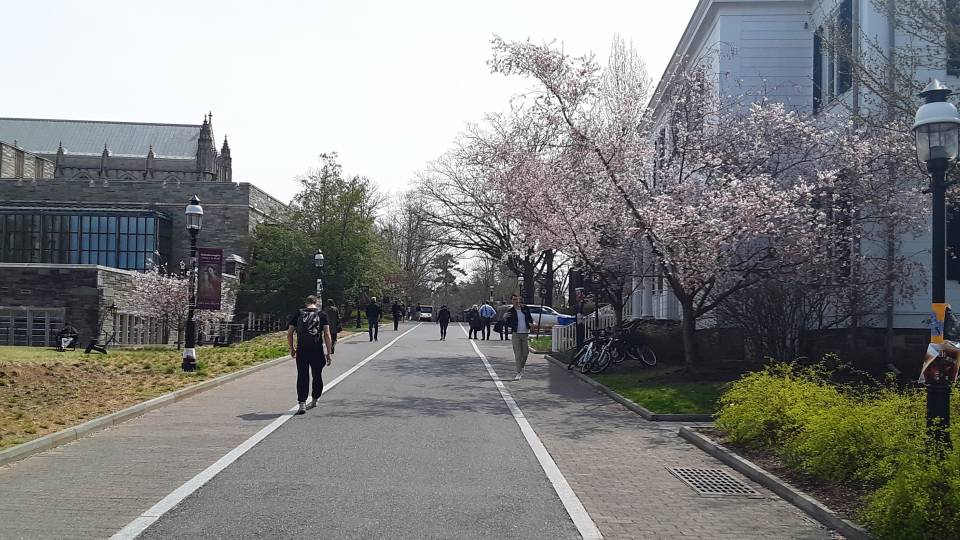Debby Foster, Princeton’s assistant vice president for University Services, plays with magnetic tiles with 4-year-old Aiden at Princeton Nursery School. Foster was among the Princeton staff who volunteered at the nursery school during the University’s annual Month of Service, which runs from Jan. 4 through Feb. 1. Reading to children in the back is Jennifer Caputo, director of operations in the Office of Alumni Affairs.
“Watch me do a magic trick,” says Aiden, a 4-year-old student at Princeton Nursery School. “I can make the blue car disappear.” Hiding cars behind magnetic tiles he asks Debby Foster, assistant vice president for University Services at Princeton, if she can find it. “Is it here?” Foster asks, pointing to the tile on the right. “No, not that side,” he exclaims, excitedly revealing the hidden car on the other side. “See, here it is. Let’s do it again.”
Nearby, Jennifer Caputo, director of operations for Princeton University’s Office of Alumni Affairs, reads to a group of children, while Kaitlin Lutz, director for administration, finance and planning in the School of Engineering and Applied Science, and Leslie Rowley, assistant director of the Kahneman-Treisman Center for Behavioral Science and Public Policy at the Woodrow Wilson School for Public and International Affairs, help children in another classroom make snowman crafts.
The four colleagues and friends spent time away from their normal work at Princeton volunteering at Princeton Nursery School as part of the University's annual Month of Service. Organized by the University’s Pace Center for Civic Engagement, Month of Service offers staff, students, faculty and alumni the opportunity to serve together on campus and in the community. From Jan. 4 through Feb. 1, more than 275 staff, students and family members will have taken part in preparatory workshops, direct service opportunities and reflection together about their experiences.
“Month of Service stems from Princeton University’s commitment to service and our desire to honor and carry forth the legacy of Martin Luther King, Jr.,” said Kimberly de los Santos, the John C. Bogle ’51 and Burton G. Malkiel *64 Executive Director of the Pace Center. “The undergraduate and graduate students who volunteer with these organizations during the academic year aim to build deep relationships with youth, with families, and with communities. We are grateful to Month of Service participants for sustaining these efforts in January and we hope that they are able to use the opportunities to explore how service can support their values, how service can be a part of learning about societal issues, and how they might play a role in community.”
This year, service opportunities included volunteering for the Pace Center’s Community House afterschool program, Cornerstone Community Kitchen, Habitat for Humanity of Burlington County and Greater Trenton-Princeton, HomeFront, Mercer Street Friends, Princeton Nursery School, TDI Connect and Trenton Area Soup Kitchen.

More than 40 members of the Princeton University community helped pack 600 meals for local youth with food donated to Send Hunger Packing Princeton and Mercer Street Friends during Month of Service.
Many volunteers signed up to engage with colleagues and took part in multiple volunteer opportunities. Pooja Makhijani, communications manager at the Princeton Institute for International and Regional Studies, and Pamela Patton, director of the Index of Medieval Art in the Department of Art and Archaeology, volunteered together for consecutive weeks at Princeton Cornerstone Community Kitchen.
“We’re literally serving the adults and children here,” said Patton, as she glided a red tray down the line and chose bread, pasta, meatballs, green beans, fruit, juice and dessert. “Our role as a server is to be nice and welcoming. I think it’s important for us to help people and for the University to reach out and show that we extend beyond our [campus] and intersect with the community.”
Other staff members made Month of Service a family affair. Bernadeta Wysocka, associate industrial liaison with the Princeton Institute for the Science and Technology of Materials, brought her 8-year-old son with her to help pack meals for Send Hunger Packing Princeton and Mercer Street Friends.
“I wanted to show him we can help people in all different ways and to understand more about food supply,” she said. “It’s important to help here in our local community.” Wysocka and more than 40 other volunteers helped sort and organize holiday food donations into 600 meals for the organizations to distribute through their programs to area youth.
In addition, participants could take a Trenton, New Jersey, historical tour facilitated by Trenton native David Brown, assistant director at the Pace Center, and attend a variety of workshops — such as “Volunteer 101,” “Allyship Through Service,” “Coalition Building Through Service,” or the “Field Guide to Service Workshop” — to enhance their understanding of service and the issues driving change in surrounding communities.
Geralyn Williams, a relatively new Princeton employee and program coordinator with the Pace Center, found the tour to be particularly enlightening. “Growing up only 45 minutes from Trenton, I had been to the city before to go to shows, the museum and the Sun National Bank Arena, but the tour showed me even more depth and history to Trenton,” she said. With stops at the Battle of Trenton historical site and Trenton Waterfront, and through conversations with Class of 1984 graduate John Hatch, a principal at architecture firm Clarke Caton Hintz, and Roberto Hernandez, executive director of community organization El Centro, the tour expanded her understanding of New Jersey’s capital.
“What better way to start a month of reflection, engagement and action than learning through immersing yourself?” she added. “I think one of the best parts of Month of Service is learning about the history and power of communities from the communities themselves.”

Leaders from the University, Municipality of Princeton, and Habitat for Humanity of Greater Burlington County and Greater Trenton-Princeton gathered on Jan. 24 to break ground on a new home that will be built in the historic Witherspoon-Jackson neighborhood in Princeton. The University also contributed $50,000 to Habitat for Humanity for the affordable housing project.
For community partners, Month of Service provides an additional boon of helping hands and support to get done critical work.
“With the extra help in the classrooms, we are able to create a more engaging learning environment,” said Rosanda Wong, executive director of Princeton Nursery School. “Whether it is reading to a small group of children, or helping a child to learn how to write their name, the more a young child is engaged one to one, the more the child will learn and focus on the activity, and have fun as well. Often volunteers are surprised of the community we serve and have served for the past 90 years, the working poor living here in Princeton and the surrounding areas, who are trying to break the poverty cycle and provide for their children. To increase the awareness of the need to help these families in our community is a critical goal of our volunteer programming here.”
“We would not be able to offer what we offer without volunteers,” said Larry Apperson with Princeton Cornerstone Community Kitchen. “Thirty-five different volunteers help us each week prepping and serving meals, sorting donations.” In addition to serving a free dinner every Wednesday from 5 to 6:30 p.m. at Princeton United Methodist Church, Princeton Cornerstone Community Kitchen also offers patrons the opportunity to choose clothing, toys and other goods donated to the church. “Some folks come for the nourishment, some for the conversation,” he said. “It’s really about coming together.”
In tandem with Month of Service, the Alumni Association’s Committee on Community Service invited alumni to take part in Tigers in Service. Each regional area, class and affiliate alumni association was invited to “unite in service” by planning a community service event or project on a date of their choosing during the January-February timeframe.
Month of Service 2019 was co-sponsored by the Alumni Association Committee on Community Service, Carl A. Fields Center for Equality and Cultural Understanding, Career Services, LGBT Center, Office of Community and Regional Affairs, Office of Human Resources, and the Program for Community-Engaged Scholarship.




